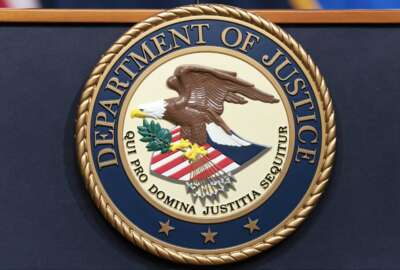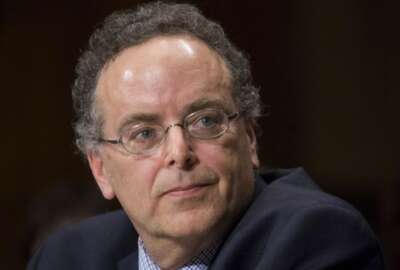This group actually tries to stop what everyone else just complains about
When corruption comes to light, it's often the Justice Department that takes the lead. Jacklyn DeMar leads a nonprofit that supports whistleblowers.
Nobody’s in favor of corruption, except maybe the corrupt. When corruption comes to light, it’s often the Justice Department that takes the lead. Jacklyn DeMar leads a nonprofit that works anti-fraud at the front end by supporting whistleblowers and is the president and CEO of the Anti-Fraud Coalition. She joined the Federal Drive with Tom Temin to discuss.
Interview transcript:
Tom Temin: And we had one of your associate attorneys on recently, and it led me to have interest in this organization. You take a little different approach in almost nurturing the whistleblowing function. Tell us more about TAF, The Anti-Fraud Coalition.
Jacklyn DeMar: So I feel like whistleblower used to be a little bit more of a bad word. But I think we’re coming around in America to realizing that this can be a good thing for everyone. And so the Anti-Fraud Coalition was really founded after the 1986 amendments to the False Claims Act, which is really the No. 1 tool for the government to recover missed, taken or stolen funds from the taxpayer. And so what the False Claims Act is really a tool for private citizens to come forward, report fraud to the government and have the government either investigate and then either take on that case for them or a whistleblower can go forward on their own and pursue that case on behalf of the government and bring back those taxpayer funds that were stolen to the government and receive a portion of those funds for doing that work. And usually, they’re insiders. They can be outside competitors or people analyzing data, but usually, they’re people inside the company that see something going wrong. They report it to the government after usually trying to report it internally and trying to get something stopped internally, nothing happens or they get retaliated against and then they end up reporting to the government. The government can either investigate and take the case on again or the whistleblower can go forward. And so what TAF does is really both support the whistleblowers and try to educate them and have them understand what these programs are because there’s a false claim that there’s also an SEC and CFTC. And also like there’s financial frauds, whistleblower programs as well that really protect the financial markets. So we try to support whistleblowers, make sure they understand these programs and then also support the attorneys that are bringing cases on behalf of the whistleblower. So making sure they have resources that access to those kinds of things.
Tom Temin: And you deal primarily with federal contracting companies, contractors and people inside those companies that you feel have access to information that could be fraud.
Jacklyn DeMar: Right. So it’s a lot of pretreatment fraud in, let’s say, the defense industry. And then the bulk of it is, I would say, Medicare and Medicaid health care fraud. There’s a lot of that kind of fraud. But then it expands into kind of you can have customs fraud and environmental kinds of fraud. But it’s all government procurement fraud.
Tom Temin: And then I guess the other interesting aspect you can tell us about is that, yes, people inside, maybe accountants, maybe program managers have access to information about what’s going on. That’s the traditional whistleblower, you might say. But then you’re developing tools and helping people look that might be external to the whole thing. But because of the availability of procurement data and maybe grant data and other forms of data, Medicare data, people can detect fraud totally externally.
Jacklyn DeMar: Yeah, that’s right. I think that you can look at trends in data. And for instance, if you’re looking at a health care fraud case, you can look at one doctor in a community that is billing for, let’s say, an opioid that’s way, way high, way more than anyone else in that community. And you can kind of look at that from an outsider and say, ‘OK, there has to be something going on here.’ You can get some more evidence. You can report that to the government. The government then has tools to go in and get into that data some more, get more information and really like develop the case from there. But it’s you can kind of spot trends in the data that can put you on the case that way.
Tom Temin: But the data itself doesn’t necessarily indicate fraud. Maybe that doctor everybody is referring pain patients or something to that particular practice. And so I guess the question is, how do you know that what you’re doing is not just annoying or harassing an innocent organization or person, but that really could be something nefarious going on?
Jacklyn DeMar: Yeah. I think usually these whistleblowers have an expertise in this area. So they would know that there’s no reason for this particular doctor to be billing this amount for this particular drug because of their expertise. Either they’re also in the industry or something like that. So they would understand this a little bit more. They have some sort of expertise that would lead them to understand and be able to develop the case a little bit better. And once you have allegations in the case, there has to be, this isn’t a mistake with statute. There has to be intent, you have to prove all of that. So this is not a statute that’s going to be prosecuting anyone for making a mistake or for like you just said, maybe there’s a legitimate reason that this person is billing this way. That’s not going to get anyone in trouble. There’s something that has to be intentional here.
Tom Temin: We’re speaking with Jacklyn DeMar. She’s president and CEO of The Anti-Fraud Coalition. And I guess in some ways, too, this is the original intent of the old medieval qui tam idea because people are suing on behalf of the royalty, in this case, the federal government, not quite royalty, but that notion applies here.
Jacklyn DeMar: Yeah. The idea is that the government is only so big and some people want it bigger and some people want it smaller. But the fact is they just don’t have the resources to identify all of the fraud that is out there. Not only do they not have the resources, but it really does. We just talked about the external whistleblowers, but as far as most of the whistleblowers are internal and there is just no way that the government could know of a fraud scheme that’s internal to a company unless there is a whistleblower that comes forward with that information. And to the extent that whistleblowers are going forward on behalf of the government, they’re really putting their private resources in to supplement all of the resources of the government, which is always a good thing because there’s never enough resources for the government to prosecute all the fraud.
Tom Temin: Any good recent cases you can point us to that the organization was involved with?
Jacklyn DeMar: There’s been a couple of very good settlements recently. I actually just was speaking the other day with a case against Acadia Behavioral Health Center. And you might have seen there is a recent New York Times exposé on this. There’s a series of articles about this behavioral health center that was actually admitting patients that didn’t need to be admitted. And this is across the country scheme. They have something like 56 facilities across the country admitting patients that didn’t need to be admitted once they were admitted or patients weren’t receiving proper treatment. And there was just a whole host of issues going on there. And that whistleblower was the director of nursing there. Blew the whistle, and they recovered about $20 million for the government.
Tom Temin: This was Medicare?
Jacklyn DeMar: Yes, this is Medicare. But there is also a Senate investigation and there are criminal investigations. And I think that’s one of the good things about this law as well is that you flagged something for the government that can lead to other investigations and kind of a bigger picture enforcement action against some really bad actors that are really committing patient harm.
Tom Temin: And personally, what draws you to this particular endeavor in life?
Jacklyn DeMar: Well, I mean, I’ve always kind of felt that I wanted to do something in this public sector that was really doing good work. And so I went to law school wanting to do that. And I found this. I didn’t know anything about whistleblower law or the False Claims Act or anything like that. But once I kind of found this, I realized that it was one, really interesting. And two, it was a good way that I could use the knowledge that I had to really do good work. I find the people that we work with, the whistleblowers, are really coming from a place where they have tried to do the right thing, and they’ve been either retaliated against or just ignored at every turn. And so they are kind of giving up basically everything to do the right thing here and blow the whistle. And yes, there’s a potential that they’re going to get a recovery. But so often they don’t or it’s not enough to like offset what they’ve really given up, because they give up their livelihoods. They give up. There’s all kinds of things that go on when you’re a whistleblower. So I just feel like the people we work with are really why I do it.
Tom Temin: And do external whistleblowers say someone who is like you passionate about this, and I’m looking at Medicare data and I see that Dr. Demento in a certain area has this outsized billing for something, and there might be really fraud going on there. He can’t retaliate against me because I don’t work there versus the nurse that’s inside that says we shouldn’t be doing this.
Jacklyn DeMar: So those whistleblowers are maybe motivated by something different, but often those whistleblowers are maybe competitors. And so if they’re looking to level the playing field for the whole community. So let’s say their competitor doctor, it’s not fair that there’s the one doctor in the community is committing fraud in order to bill for all of these things when everyone else is trying to play by the rules. And so I think that’s really, I find that is a respectable motivation as well as trying to just like level that playing field for the whole community.
Tom Temin: And finally, what do you estimate are the qui tam recoveries that your members have gotten since you’ve started this?
Jacklyn DeMar: Well, since I’ve started, I’ve no idea. I can give you the numbers. So there’s about $72 billion that have been recovered under the False Claims Act since 1986 amendments, which really made the False Claims Act what it is. It really wasn’t very enforceable before the 1986 amendments, but it has been on the books since the Civil War. And it has been used. It had been amended before that so that it was a little bit not as usable, but since 1986, about $72 billion in about $53 billion of that has been the result of whistleblower actions. So the vast majority of the recoveries have been from whistleblower actions.
Copyright © 2025 Federal News Network. All rights reserved. This website is not intended for users located within the European Economic Area.
Tom Temin is host of the Federal Drive and has been providing insight on federal technology and management issues for more than 30 years.
Follow @tteminWFED






